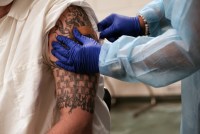Latest KFF Health News Stories
From the FDA’s Empty Seat to Chock-Full ICUs, Journalists Recap the Week’s Stories
KHN and California Healthline staff made the rounds on national and local media this week to discuss their stories. Here’s a collection of their appearances.
Low Wages and Pandemic Gut Staffing Support for Those With Disabilities
Group homes and facilities that serve people with intellectual and developmental disabilities were hurting for staffers before the pandemic. Now the nationwide job crunch and pandemic pressures are making it even worse.
The Solution to Au Pairs’ Health Coverage Gaps May Be Simple: ACA Plans
Private agencies that bring young adults to the U.S. to care for children generally offer basic health insurance, but plans may exclude many types of necessary care. What the agencies might not mention is that au pairs are eligible to enroll in comprehensive coverage on the Affordable Care Act marketplaces and likely qualify for premium subsidies that would make the insurance affordable.
ECMO Life Support Is a Last Resort for Covid, and in Short Supply in South
Many more people could benefit from the lifesaving treatment than are receiving it, which has made for messy triaging as the delta variant surges across the South and in rural communities with low covid vaccination rates.
KHN’s ‘What the Health?’: The Future of Public Health
The covid pandemic has spotlighted the often-unseen role of public health in Americans’ daily lives. And the picture has not all been pretty. What is public health and why is it so important — and controversial? Dr. Ashish Jha, dean of the Brown University School of Public Health, explains the basics. Then, Joanne Kenen of Politico and Lauren Weber of KHN join KHN’s Julie Rovner to discuss what could happen next.
Telemedicine Abortions Offer Cheaper Options but May Also Undermine Critical Clinics
A change in FDA rules during the pandemic has let women receive the drugs needed for a medical abortion by mail after a telemedicine appointment. While some abortion rights advocates hail the move, others note that these services, which are often cheaper than going to a clinic, could siphon away patients needed to keep those brick-and-mortar facilities operating.
Beneficiarios de Medicaid se vacunan mucho menos contra covid
Si bien más de 202 millones de estadounidenses están vacunados al menos en parte contra covid, casi el 30% de las personas mayores de 12 años siguen sin vacunarse. Las encuestas muestran que los más pobres tienen menos probabilidades de recibir una vacuna.
Democrats Say Abortion Is on the Line in Recall Election. But Rolling Back Rights Wouldn’t Be Easy.
Reproductive rights groups and Democratic Gov. Gavin Newsom argue that Californians’ access to abortion would be threatened if he is recalled. But a replacement governor’s power to restrict access to the procedure would be limited.
Medicaid Vaccination Rates Founder as States Struggle to Immunize Their Poorest Residents
Efforts by states and the private health plans that many states pay to cover low-income Americans has been scattershot and hampered by a lack of data.
Pandemia revela una creciente crisis de suicidios en comunidades de color
Entrevistas con una docena de investigadores del suicidio, datos recopilados de todos los estados, y una revisión de décadas de investigación revelaron que el suicidio es una crisis creciente para las comunidades de color, que ya estaba impactando antes de la pandemia, y que se ha agravado desde entonces.
Pandemic Unveils Growing Suicide Crisis for Communities of Color
Suicides have risen among Black, Hispanic and other communities of color during covid. But the rates were already escalating before the pandemic struck.
Can Biden’s Plan to Remove Urban Highways Improve the Health of American Cities?
Pollution and noise from urban highways intersect with illness for neighbors. But “green” developments that replace them can displace the very families harmed in the first place.
KHN’s ‘What the Health?’: Becerra Urges Congress to Expand Medicare, Address Rx Prices
Health and Human Services Secretary Xavier Becerra is the special guest for this bonus episode of KHN’s “What the Health?” podcast. He and host Julie Rovner discuss a breadth of topics the secretary oversees, including covid-19, prescription drug prices, Medicare, Medicaid and the Affordable Care Act.
Most Inmates Have Had Their Covid Shots — But Their Guards Likely Haven’t
Hesitancy about the vaccines among prison staffers has led to a striking disparity: Inmates are better protected than corrections officials.
Journalists Discuss Long Covid, Delta Variant, Clinic for Migrants
KHN and California Healthline staff made the rounds on national and local media this week to discuss their stories. Here’s a collection of their appearances.
California Lawmakers Push Feds to Allow a Therapy That Pays Meth Users to Abstain
The approach, known as contingency management, has helped thousands of veterans kick the methedrine habit, but a federal government ruling has limited its use. California hopes to challenge that and make the treatment a Medi-Cal benefit.
La pandemia proyectará una larga sombra sobre la salud estadounidense, lo que hará que millones de personas vivan más enfermas y mueran más jóvenes debido a las crecientes tasas de pobreza, hambre e inseguridad en la vivienda.
Black and Hispanic Americans Suffer Most in Biggest US Decline in Life Expectancy Since WWII
The pandemic will undermine Americans’ health for years. Even those not infected by the coronavirus could suffer health problems related to poverty, job loss, eviction — or all of the above.
At Texas Border, Pandemic’s High Toll Lays Bare Gaps in Health and Insurance
In Texas’ border communities, which are overwhelmingly Hispanic, covid-19 death rates for people under age 65 were double those in the rest of the state and three times the national average. They were also significantly higher than rates in New Mexico border areas.
Hospitals, Insurers Invest Big Dollars to Tackle Patients’ Social Needs
Eager to control costs, health systems and insurers are trying to address patients’ social needs such as food insecurity, transportation and housing. Yet, after years of testing, there’s slim evidence these efforts pay off.





















